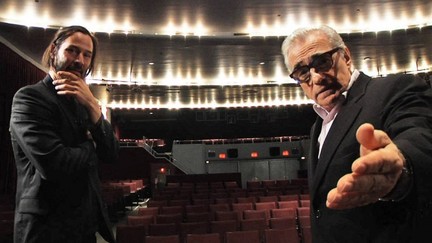Kenneally doesn't put his finger on the scale when it comes for the viewer to decide which format is 'better.' In every technical aspect of filmmaking, starting with cinematography and moving through editing, coloring, and VFX, there are pro and con arguments, with each side backed by a talking head's idiosyncratic preference. Someone like Fincher, known for demanding take after take after take, would want to use digital because he can leave the camera going forever, unlike film which has to be changed every ten minutes. Conversely, someone like Richard Linklater, whose films have a very laid-back quality, might want to take advantage of all the breaks that using film comes with to give his actors more off-camera time and stay relaxed and comfortable. Spectacle hounds like James Cameron or Lucas long-ago converted to digital, the better to incorporate CGI and 3-D, while film fetishists like Quentin Tarantino and Paul Thomas Anderson (regretfully, neither are interviewed) aren't about to forsake the medium of Leone and Altman for what they might call empty effects.
The technical arguments are just as potent as the artistic ones. Where cinematographers used to function as engineering wizards, taking the film from a day's shooting and turning it into dailies the next morning while everyone else dreamed about how their work went, the whole production can now see the result as it's captured. While this sounds ideal, film proponents just call it a distraction, as actors want to watch every take and get lost in the weeds. The ultimate benefit of digital is described as democratization, as anyone with a camera and a plan can make a decent-looking film, though there are still detractors who deride this as a race to the middle. It's here that digital makes its strongest argument. This is more voices getting their ideas into the marketplace, voices that might otherwise run into the financial barriers that producing on film entails, an unqualified good and an instance of capitalism doing what it's meant to do. I love PTA and Tarantino, but if shooting on digital means we find the next versions of them sooner, then put me on Team Digital.
Side By Side is a must for any movie nerd. It demystifies the process of filmmaking and plainly lays out the arguments for and against digital as a medium. Hardly a dry, educational tome, the many charismatic filmmakers (and George Lucas) liven up the technical talk, pouring their enthusiasm for their calling into Kenneally's camera. It may not appeal beyond those deeply interested in its subject, but when the viewer is interested, this is as fascinating as documentaries get. B+

 RSS Feed
RSS Feed